Generative AI has been a hot topic in the creative industry, with many artists and illustrators expressing concerns about its implications. Recently, Procreate, a popular iPad illustration app, made a bold statement by declaring that they will not be incorporating generative AI into their products. This decision has sparked conversations and debates within the creative community about the role of AI in art and design.
One of the main concerns raised by digital illustrators is the fact that AI models have been trained on their content without their consent or fair compensation. This raises questions about intellectual property rights and the ethics of using AI to create art. Additionally, there is a fear that the widespread adoption of generative AI tools will lead to a decrease in employment opportunities for human artists. The rise of automation in the creative field has sparked a sense of unease among many in the industry.
Procreate’s CEO, James Cuda, expressed his disapproval of the direction that the industry is heading in with regards to generative AI. He emphasized the importance of preserving the humanity and creativity in art, stating that AI is “ripping the humanity out of things.” Procreate’s firm stance against generative AI has been met with praise from creatives online who share similar concerns about the impact of AI on the artistic process.
The announcement from Procreate has had a ripple effect in the industry, with other companies like Clip Studio Paint reconsidering their plans to introduce AI-powered features. Companies such as Wacom and Wizards of the Coast have also faced backlash for unintentionally using AI-generated assets in their products. Even Adobe, known for its creative software, has been criticized for its approach to generative AI tools and its impact on independent artists and creators.
Procreate has positioned itself as a beacon of integrity in the creative industry by maintaining a one-time purchase model and steering clear of subscription-based services. This commitment to transparency and user-centric design has endeared the company to many artists who value authenticity and ethical practices. Procreate’s decision to reject generative AI aligns with its core values and has solidified its reputation as a company that prioritizes the needs of creatives.
The debate surrounding generative AI in the creative industry is multifaceted and complex. Artists and illustrators are grappling with questions about the future of art and the role of technology in the creative process. Procreate’s bold stance against the integration of generative AI serves as a rallying cry for those who value human creativity and artistic expression. As the industry continues to evolve, it is essential for companies to consider the ethical implications of AI technologies and to prioritize the well-being of artists and creators.


Leave a Reply